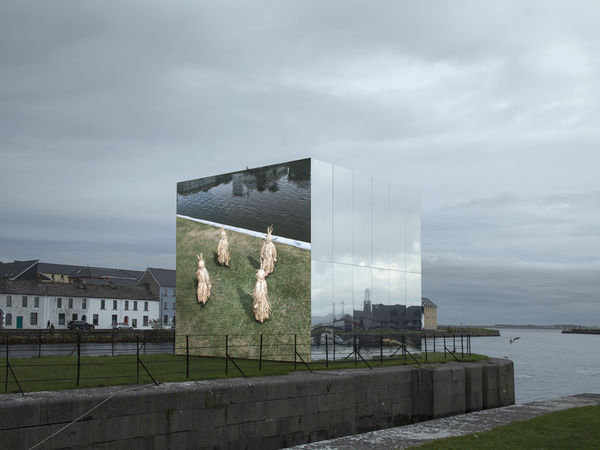
Daniel Carey is Director of the Moore Institute for Research in the Humanities and Social Studies at the National University of Ireland Galway and Professor of English in the School of English and Creative Arts. He is a Vice-President of the Royal Irish Academy and a board member of the Irish Research Council. He was Chair of the Irish Humanities Alliance from 2014 through 2016.
During the pandemic, Professor Carey has worked to forge new paths at NUI Galway and in Ireland with virtual instruction and finding ways to reach new and existing audiences. As a member of his university's Covid Response Group, he has focused on the pandemic from a humanities and social studies perspective—leading explorations of the effect of the pandemic in such areas as political culture and its influence on decision-making; social media and the virus; education; racism; historical precedents; the psychology of infectious disease; security; and globalization.
While a frequent collaborator with the Institute and Notre Dame International's programs in Dublin, at NUI Galway, and at the Kylemore Abbey Global Centre, Professor Carey first visited Notre Dame at the start of the Fall 2018, when he accepted an invitation to be a short-term fellow. In his two-week stay, he met with graduate students studying Jonathan Swift, and with faculty and students in a number of departments; continued research on his major international project to edit the work of Richard Hakluyt [http://www.hakluyt.org/]; and gave a memorable lecture on "Swift, Gulliver, and the Art of Travel" to open that year's Speakers and Public Talks Series. He also explored campus and the city of South Bend on a borrowed bicycle and attended his first Notre Dame football game.
Professor Carey made an early effort to adopt and experiment with webinars during the crisis and has hosted and moderated many for both the Moore Institute and the Royal Irish Academy. They include "Data, Ethics and the Covid-19 Crisis"; "Slavery, Race, and COVID-19"; and "Ireland, Borders, and Covid-19"—all recorded and archived on the Moore Institute website.
He has also contributed to the Moore Institute's blog, with posts on "The Use of Metaphor in the Coronavirus Panademic" and "Effects of Covid-19 on our society foretold by Defoe long ago."
Writing from Galway in late November, Professor Carey provided these answers to our Three Questions.
______________________
What are you working on?
I’m trying (fitfully) to work on a few different pieces at the moment. One concerns Daniel Defoe’s relationship to economics, a longstanding critical question that involves reengaging with narratives such as Robinson Crusoe (1719) and Roxana (1724), as well, of course, with his conduct book, The Complete English Tradesman (1726). Another piece that I’ve been chipping away at considers the genre of captivity narratives which flourished in the seventeenth and eighteenth centuries, not just in the New World but in tales from North Africa and the Barbary Coast. The to-do list (short version) rounds off with a rereading of Thomas Harriot’s Briefe and True Report of the Newfound Land of Virginia (1588). I come at this from a different angle by setting it in the context of the work’s appearance in a sequence of texts about Virginia printed (or reprinted) by Richard Hakluyt in The Principal Navigations…of the English Nation (1598-1600). Situating it in this field provides a very different inflection.
What are you reading?
While this might seem like a somewhat random selection, here goes: I’m rereading Breandán Mac Suibhne’s The End of Outrage: Post-Famine Adjustment in Rural Ireland (2017), a remarkable piece of writing and research. I’m halfway through Michael W. Twitty, The Cooking Gene: A Journey through African American Culinary History in the Old South (2017), quite an extraordinary book. Both of these have emerged from trying to think about rural matters with a group brought together by a friend at Clemson University, Lee Morrissey. I’ve been working away at Thoreau’s Walden, a kind of companion book in lockdown conditions, which amazes me in its freshness and ability to speak to the present in an antique voice. To keep my interests in early modern travel going, I’m reading Diego Sola's El cronista de China: Juan González de Mendoza, entre la mission, el imperio y la historia (2018), a very impressive work of history based on a recent PhD dissertation. Then there is Captain John Smith’s True Travels, Adventures and Observations (1630). In the realm of fiction I just finished Richard Ford’s new book of stories, Sorry for Your Trouble (2020), in which Ireland and Irishness are a recurrent theme.
What, during the pandemic, are you missing?
Most people would give a similar answer, I expect. For me, it’s missing the chance to travel home to see my family in the US, along with academic trips that punctuate the year in normal times; the ordinary exchanges between colleagues in the corridor, on the way to meetings or back again, the details and stories that make up a community. Very little of that survives on Microsoft Teams. But there have been upsides: walking along the River Corrib and attending in unfamiliar ways to the near at hand; the unexpected burst of light and movement in the Mirror Pavilion installation; different reading habits (following outright curiosity and a more random path); and engagement with so many interesting people through Zoom webinars. It feels at times like camping out, entering a new space and a new world that seems, even as it endures, still temporary.
